Overview
Existential therapy techniques for personal growth gently guide individuals toward self-exploration, mindfulness, and empowerment in confronting their life choices and values. Have you ever felt overwhelmed by your past? These techniques, including narrative therapy, mindfulness practices, and structured worksheets, foster deeper self-awareness and resilience.
As we explore this further, you'll find that they ultimately lead to transformative personal development, creating a path toward healing and growth. Embrace the journey of self-discovery and consider how these practices can support you in navigating your unique experiences.
Introduction
Existential therapy has emerged as a powerful approach for personal growth, inviting individuals to explore the depths of their existence and confront the complexities of their choices. Have you ever felt overwhelmed by your past? By integrating tailored techniques that emphasize self-reflection, mindfulness, and narrative exploration, individuals can unlock transformative insights into their lives. However, the journey of self-discovery often raises a compelling question: how can one effectively navigate the shadows of past experiences while forging a path toward a more fulfilling future?
As we explore this further, this article delves into seven essential existential therapy techniques that not only foster personal development but also empower individuals to reclaim their narratives and embrace their true selves.
The Emerald Couch: Tailored Existential Therapy for Personal Growth
At The Emerald Couch, existential therapy is thoughtfully tailored to meet the unique needs of each individual. It focuses on exploring existence, choices, and the significance of life experiences. Have you ever felt overwhelmed by your past? By integrating trauma-informed care, our therapists guide individuals through their past traumas, nurturing resilience and fostering growth. This personalized approach not only creates a safe and supportive environment but also facilitates profound personal insights and healing.
Research indicates that trauma-informed care significantly enhances therapeutic outcomes. Individuals often report improved emotional regulation and a heightened sense of agency in their lives. Methods such as:
- Narrative approaches
- Mindfulness exercises
- Reflective journaling
are existential therapy techniques that empower individuals to confront their existential challenges and cultivate a deeper understanding of their identities.
Ultimately, this individualized existential treatment encourages transformative development. It enables individuals to reclaim their narratives and envision a future free from the shadows of past traumas. As we explore this further, consider how this compassionate approach could support your journey toward healing and self-discovery.
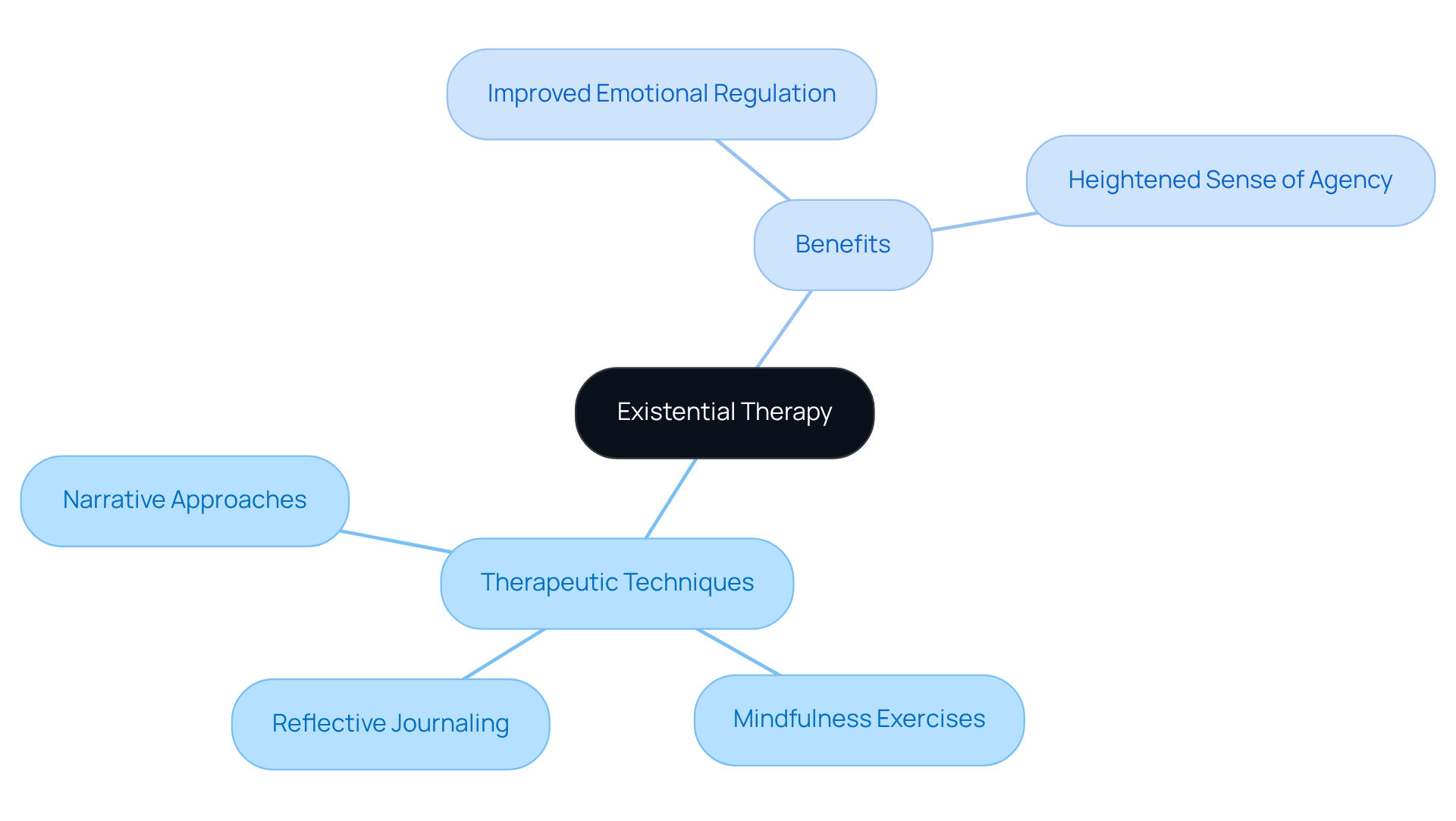
BetterHelp: Online Existential Therapy Techniques for Growth
The Emerald Couch offers a variety of existential therapy techniques that you can access online, making it easier for you to engage in self-improvement from the comfort of your own home. Techniques such as guided self-reflection and journaling exercises are commonly employed as existential therapy techniques to assist you in exploring your values and beliefs. Mindfulness, a crucial aspect of many therapeutic approaches, plays a transformative role in enhancing emotional regulation and personal growth. By incorporating mindfulness practices such as meditation and mindful breathing, you can cultivate greater self-awareness and learn to observe your thoughts and emotions without judgment. This practice is essential for meaningful personal growth.
Have you ever felt overwhelmed by your past? According to a meta-analysis published in the Journal of Anxiety Disorders, maintaining consistency in treatment sessions is vital, and the convenience of online support platforms significantly enhances this consistency. Furthermore, research indicates that virtual counseling can greatly improve self-awareness and emotional strength, with 91% of participants expressing satisfaction with telehealth services. By engaging in these reflective practices alongside mindfulness and incorporating existential therapy techniques, you can foster a deeper awareness of yourself, ultimately promoting development and healing.
The Emerald Couch emphasizes a holistic approach to mental well-being, ensuring that you receive comprehensive support tailored to your unique needs. Whether you prefer in-person or telehealth sessions, the goal is to provide you with the nurturing care necessary for your journey towards healing.
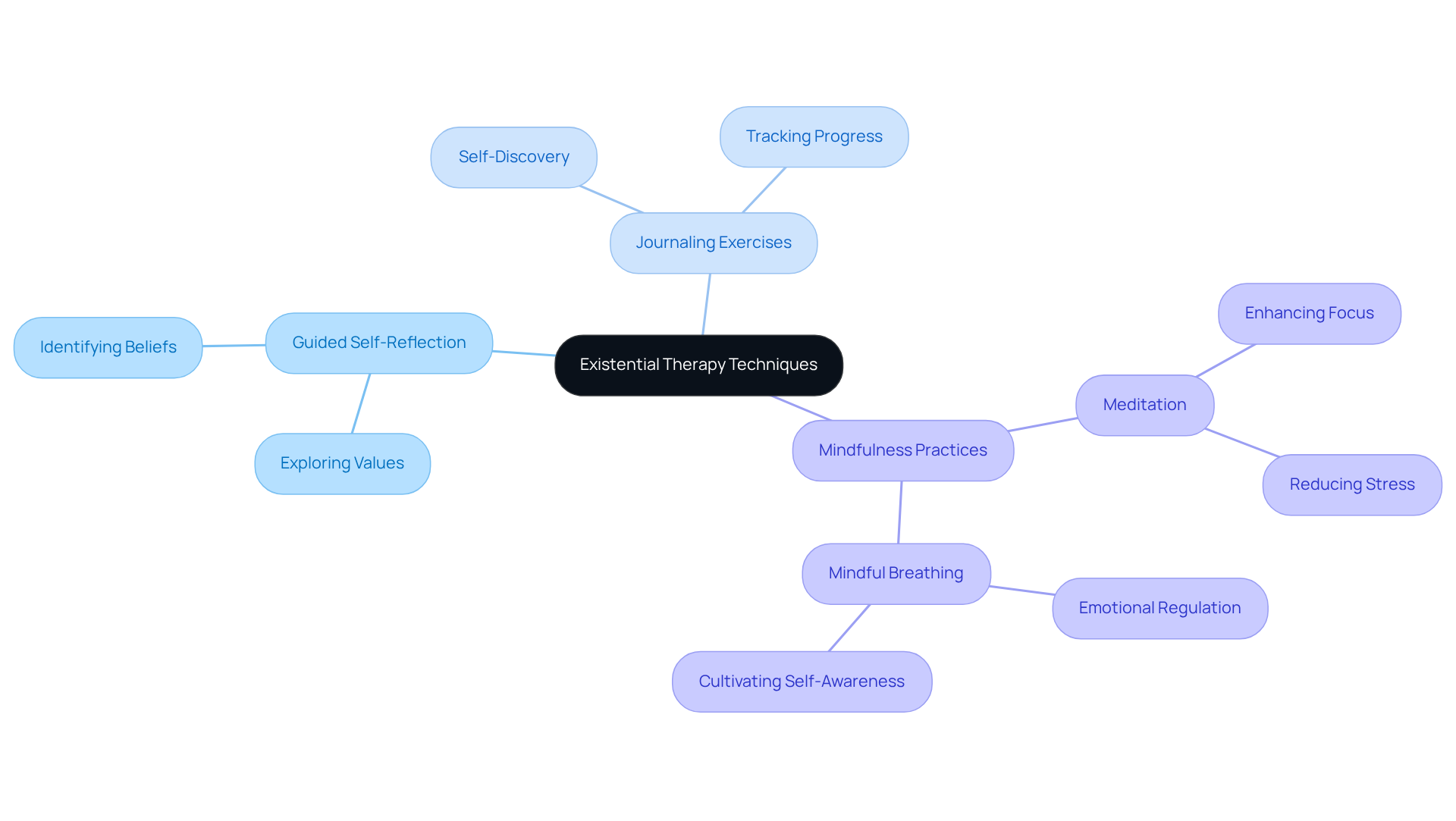
Healthline: Key Existential Therapy Techniques for Personal Development
Existential therapy techniques offer several key methods that play a crucial role in personal development. One of the most impactful methods is existential questioning, which encourages individuals to confront their beliefs and values in a direct manner. This process not only enhances self-awareness but also invites reflection on life choices and the motivations behind them. Through this introspective dialogue, individuals can uncover deeper insights into their existence and the meaning they derive from their experiences.
Another essential technique is the exploration of freedom and responsibility. This approach helps individuals recognize their active role in shaping their lives, highlighting their power to make choices that align with their values and aspirations. Such recognition can be particularly transformative for trauma survivors, empowering them to reclaim agency over their narratives and foster resilience in the face of adversity. However, it’s important to acknowledge that this realization can also be anxiety-inducing, as individuals confront the weight of their choices and the responsibilities that come with them.
Incorporating mindfulness practices, such as meditation and mindful breathing, into existential therapy techniques can further enhance their effectiveness. Mindfulness encourages individuals to slow down and observe their thoughts and feelings without judgment, creating a space for deeper self-reflection. This practice can help trauma survivors manage anxiety and emotional overwhelm, allowing them to engage more fully with existential questioning and the exploration of their freedom and responsibility.
These techniques are not merely theoretical; they have practical applications that can lead to significant growth. Have you ever felt overwhelmed by your past? Many individuals express a newfound clarity regarding their objectives and a revitalized sense of purpose after participating in existential therapy. Insights from psychologists emphasize that understanding one’s freedom and responsibility is vital for individual growth, motivating people to take ownership of their choices and the outcomes that follow.
Ultimately, the integration of existential therapy techniques, along with existential questioning, the exploration of freedom and responsibility, and mindfulness practices creates a supportive framework for clients to navigate their unique challenges. This collaborative approach encourages a deeper awareness of themselves and their role in the world, promoting substantial self-improvement. As we explore this further, consider how these techniques might resonate with your own journey toward healing.
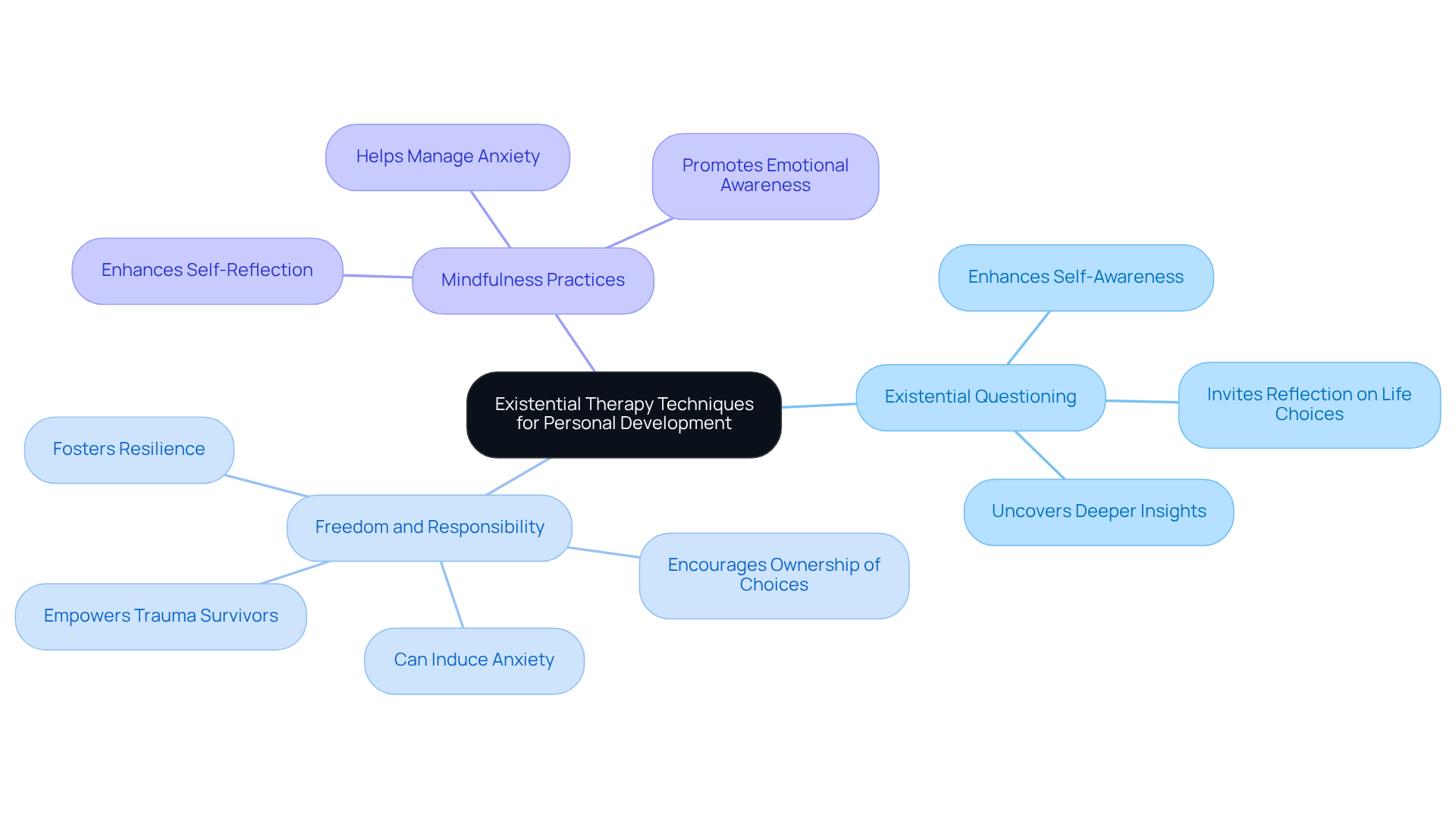
GoodTherapy: Practical Existential Therapy Techniques for Self-Improvement
Engaging in creative expression, such as art or writing, serves as a powerful tool for self-improvement and personal growth when using existential therapy techniques in psychotherapy. Have you ever felt overwhelmed by your past? This approach allows individuals to explore their emotions and thoughts in a safe and non-verbal manner, which is particularly beneficial for those who find it challenging to articulate complex feelings.
Art healing, as practiced at The Emerald Couch, follows a structured process that includes:
- Assessment
- Art-making
- Reflection
- Interpretation
Research indicates that art intervention can significantly reduce trauma-related symptoms, enhance self-esteem, and improve emotional regulation among participants. For instance, survivors of trauma often utilize visual arts to externalize overwhelming emotions, providing a symbolic way to process their experiences.
Creative activities, such as tracing body outlines on large sheets of paper or building ofrendas for cultural rituals, are integrated into the art-making phase, fostering a sense of community and connection while alleviating feelings of loneliness and isolation. As we explore this further, by integrating existential therapy techniques into treatment, individuals at The Emerald Couch can achieve a deeper understanding of their emotional landscapes, enabling continuous self-exploration and development.
Embracing imperfection in the creative process is crucial, as it allows individuals to engage without the pressure of producing a perfect outcome. To begin, trauma survivors are encouraged to start a journal or participate in group art activities, which can enhance their healing journey. Remember, the path to healing is a personal journey, and every step taken is a step towards understanding and growth.
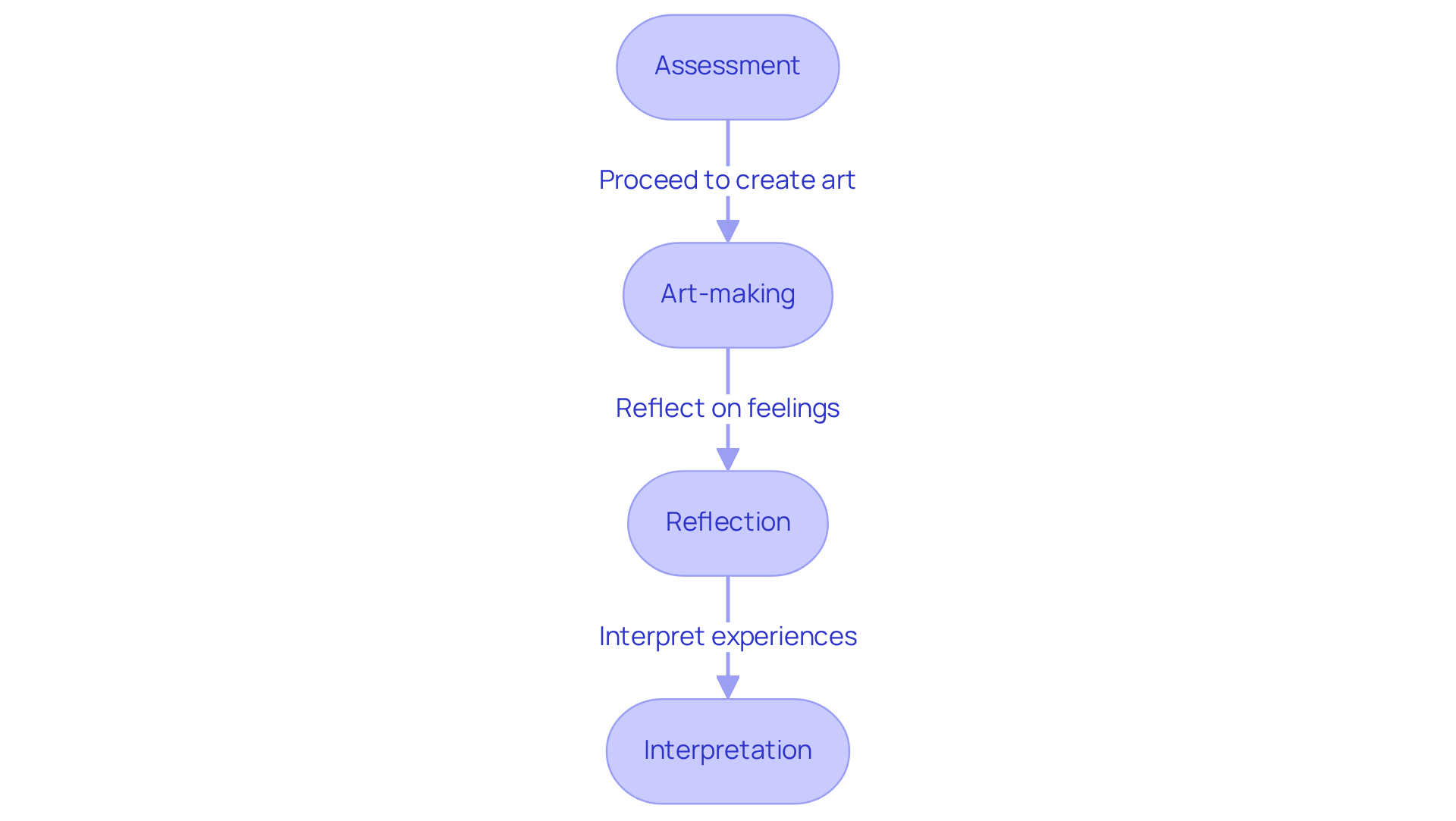
Verywell Mind: Effective Existential Therapy Techniques for Personal Growth
Existential therapy techniques employ several effective methods, one of which is narrative therapy. This approach empowers individuals to reframe their life stories and find meaning in their experiences. Not only does it facilitate healing, but it also enhances self-awareness and personal growth—especially for overachievers who often struggle to prioritize their needs above work or family. Have you ever felt overwhelmed or anxious, perhaps haunted by past trauma? For many overachievers, these feelings can make goal-setting a crucial aspect of the therapeutic process, allowing clients to create actionable steps toward their desired outcomes. Research indicates that organized goal-setting in treatment significantly enhances participant outcomes, cultivating a sense of purpose and direction in life.
In existential counseling sessions at The Emerald Couch, therapists guide clients through specific goal-setting strategies tailored to their unique challenges. Clients may be encouraged to articulate their long-term aspirations, breaking them down into smaller, manageable objectives. This method not only clarifies their vision but also instills a sense of agency and responsibility in their journey toward personal fulfillment.
Real-life examples highlight the transformative power of goal-setting in existential therapy techniques. One individual, grappling with anxiety and feelings of isolation, collaborated with their therapist to identify a goal of reconnecting with friends. By setting incremental steps—such as reaching out to one friend each week—they gradually rebuilt their social network, significantly alleviating their feelings of loneliness. Another client focused on career ambitions, establishing a goal to explore new job options. Through targeted actions, such as updating their resume and networking, they successfully transitioned to a more fulfilling role.
These methods not only enhance the therapeutic experience but also empower individuals to take control of their lives, fostering resilience and growth as they navigate their unique challenges. The holistic approach of The Emerald Couch, with its tailored treatment planning beginning with an intake session, aligns seamlessly with these goal-setting strategies. It emphasizes the potential for post-traumatic growth as individuals work toward their aspirations, inviting you to consider how such a journey could unfold for you.
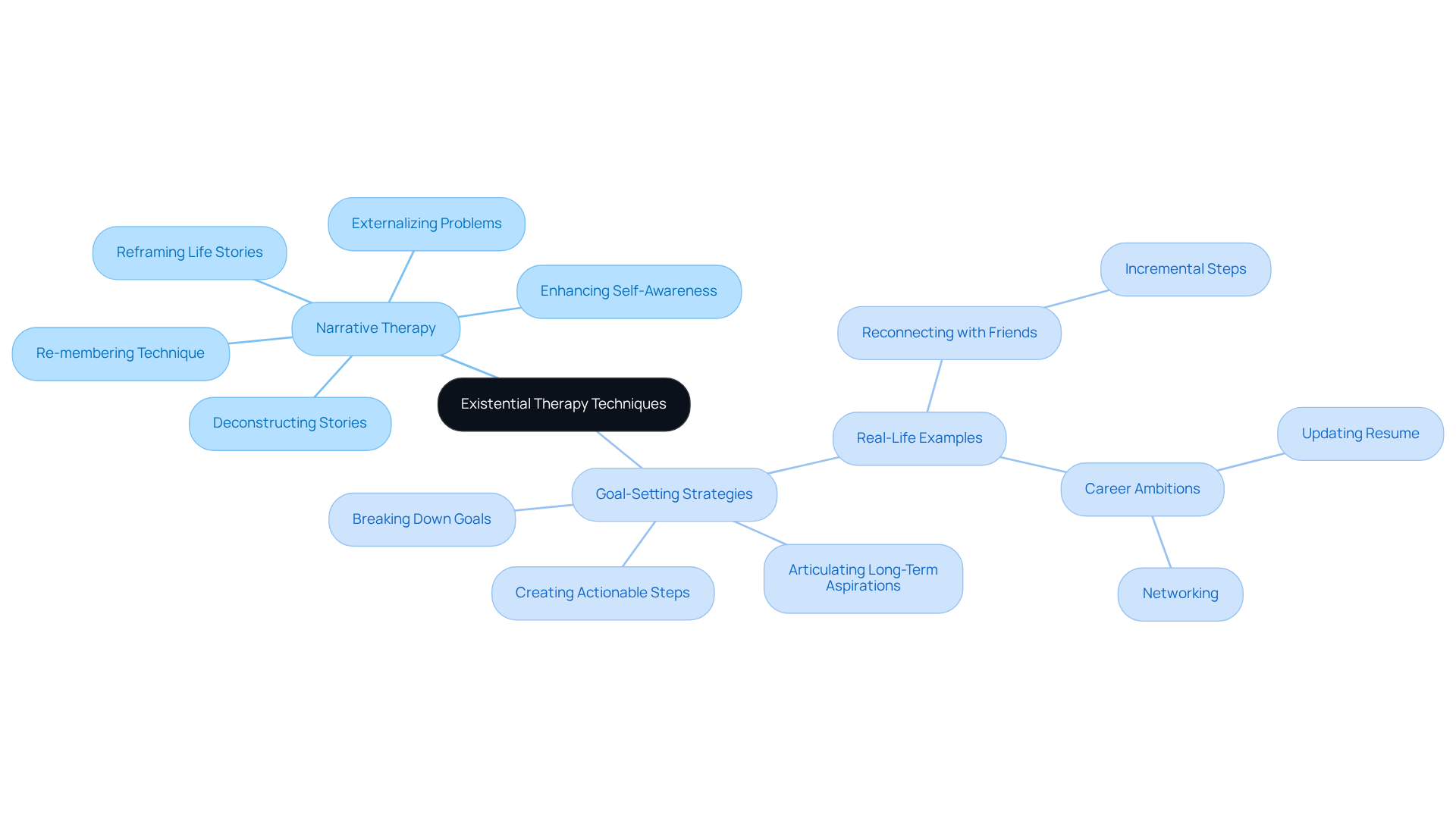
Choosing Therapy: Existential Techniques for Enhancing Personal Growth
Existential therapy techniques serve as a profound method in therapy, encouraging individuals to thoughtfully examine their life choices and their impact on overall well-being. Have you ever felt overwhelmed by your past? By utilizing existential therapy techniques, therapists create a safe space for engaging in dialogues about fears, aspirations, and the meaning behind personal experiences. This nurturing process not only fosters self-awareness but also paves the way for significant change, empowering individuals to navigate their unique paths to growth.
Real-world applications of these dialogues have shown remarkable enhancements in individuals' mental well-being. As they learn to contextualize their choices within their emotions and relationships, they begin to understand their journeys more deeply. Research indicates that therapeutic relationships, characterized by trust and understanding, are key predictors of positive outcomes in mental health treatment. By prioritizing these compassionate dialogues, therapists can effectively implement existential therapy techniques to guide individuals toward a deeper understanding of themselves and their potential for transformation.
As we explore this further, consider how these conversations could illuminate your path to healing. Seeking therapy can be a courageous step toward understanding your emotions and embracing the journey ahead.
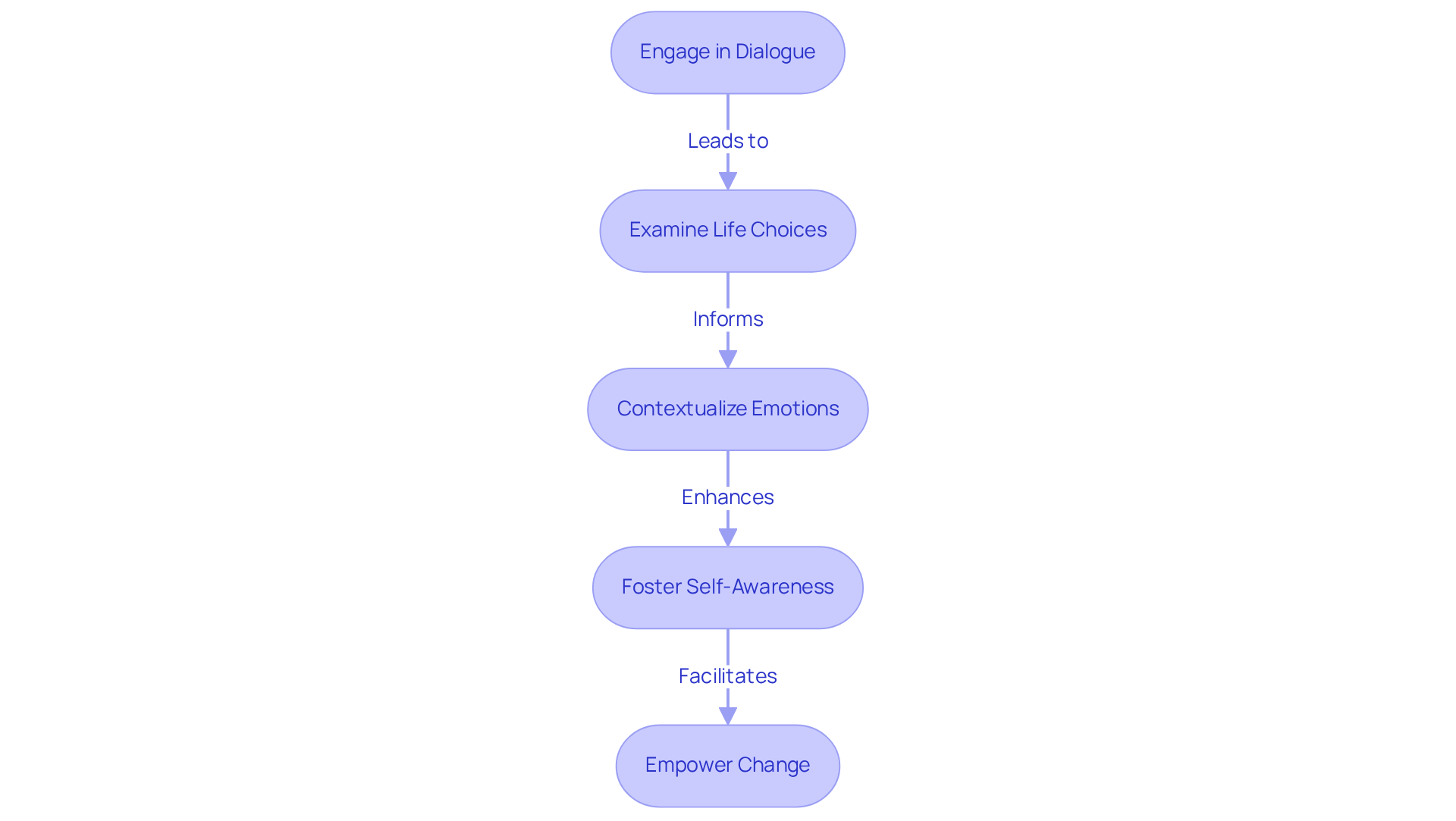
CarePatron: Structured Existential Therapy Techniques for Growth
Structured existential therapy techniques, including worksheets and guided exercises, play a crucial role in helping individuals explore their thoughts and feelings. These methods serve as a roadmap, allowing individuals to systematically investigate their inner experiences while monitoring their progress over time. For instance, the Meaning-making Worksheet encourages individuals to reflect on significant life events, fostering a deeper understanding of their values and the meaning derived from their experiences. Likewise, the Values Exploration Worksheet assists individuals in recognizing core values, connecting them to their sense of purpose, ultimately improving their quality of life.
Have you ever felt overwhelmed by your past? Real-life applications of these worksheets demonstrate their effectiveness in therapy. Clients often report enhanced self-awareness and the ability to make more meaningful choices based on internal values rather than external pressures. Techniques like the Death Awareness Exercise Worksheet encourage individuals to face their mortality, leading to deep reflections on life priorities and personal significance. This aligns with findings indicating that death awareness activities motivate individuals to contemplate their mortality, ultimately enriching their therapeutic experience.
As we explore this further, insights from therapists indicate that these structured approaches not only facilitate deeper engagement but also enhance the overall therapeutic experience. Amanda Jensen-Doss emphasizes that regularly observing patient progress during treatment is essential to evidence-based practice, which can greatly enhance outcomes. By incorporating worksheets into existential therapy techniques, practitioners can provide clients with practical tools for introspection and development, ultimately enabling them to navigate their unique challenges with greater clarity and purpose.
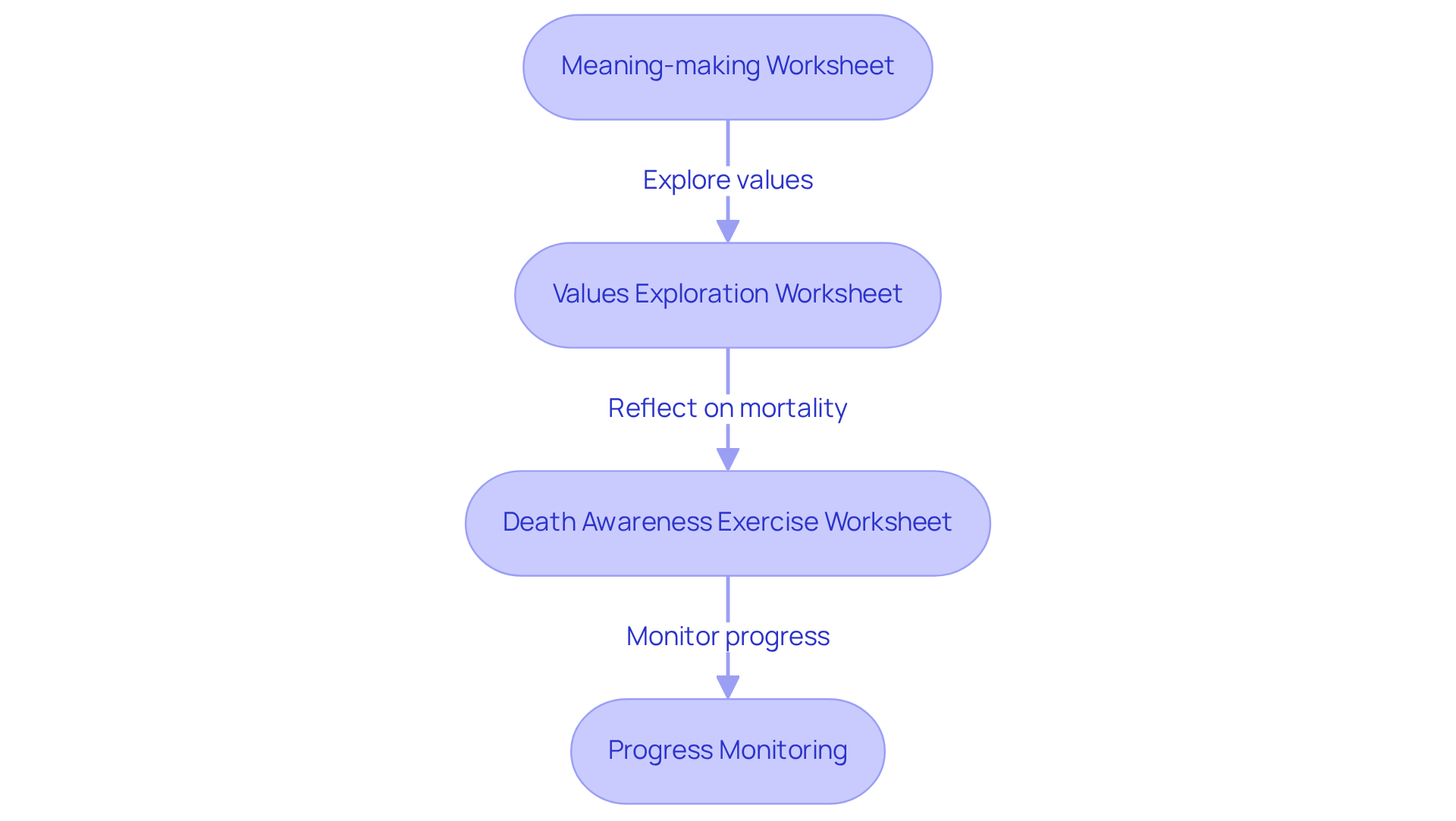
Counselling Tutor: Existential Therapy Techniques for Personal Development
Existential therapy techniques emphasize the importance of self-exploration and examining life choices, which are essential steps for individual growth. Have you ever felt a yearning to understand your motivations and desires more deeply? Clients are gently encouraged to engage in reflective practices that illuminate their unique experiences, fostering a profound understanding of themselves. This process is vital for identifying areas ripe for growth and establishing meaningful goals.
Techniques like the Values Exploration Worksheet invite individuals to contemplate various life areas, including relationships and ambitions. By participating in these exercises, individuals can gain clarity on their core values, enhancing their sense of purpose and meaning in life. Research shows that existential counseling sessions, typically lasting 45 to 60 minutes and arranged weekly, can significantly improve individuals' quality of life by equipping them with resources to navigate feelings of aimlessness and confusion.
Real-world examples, such as the Death Awareness Exercises, illustrate how confronting mortality can lead to greater self-awareness and a reevaluation of priorities. Clients engaging in these exercises often report a newfound appreciation for life and a clearer understanding of what truly matters to them. Additionally, the Authenticity Assessment Worksheet helps individuals evaluate their level of authenticity, encouraging them to align their actions with their true selves.
Overall, the reflective practices associated with existential therapy techniques not only promote individual development but also empower individuals to take responsibility for their decisions. This nurturing approach fosters resilience and advancement in their lives, guiding them toward a brighter future. If you resonate with these experiences, consider exploring the transformative journey of existential therapy.
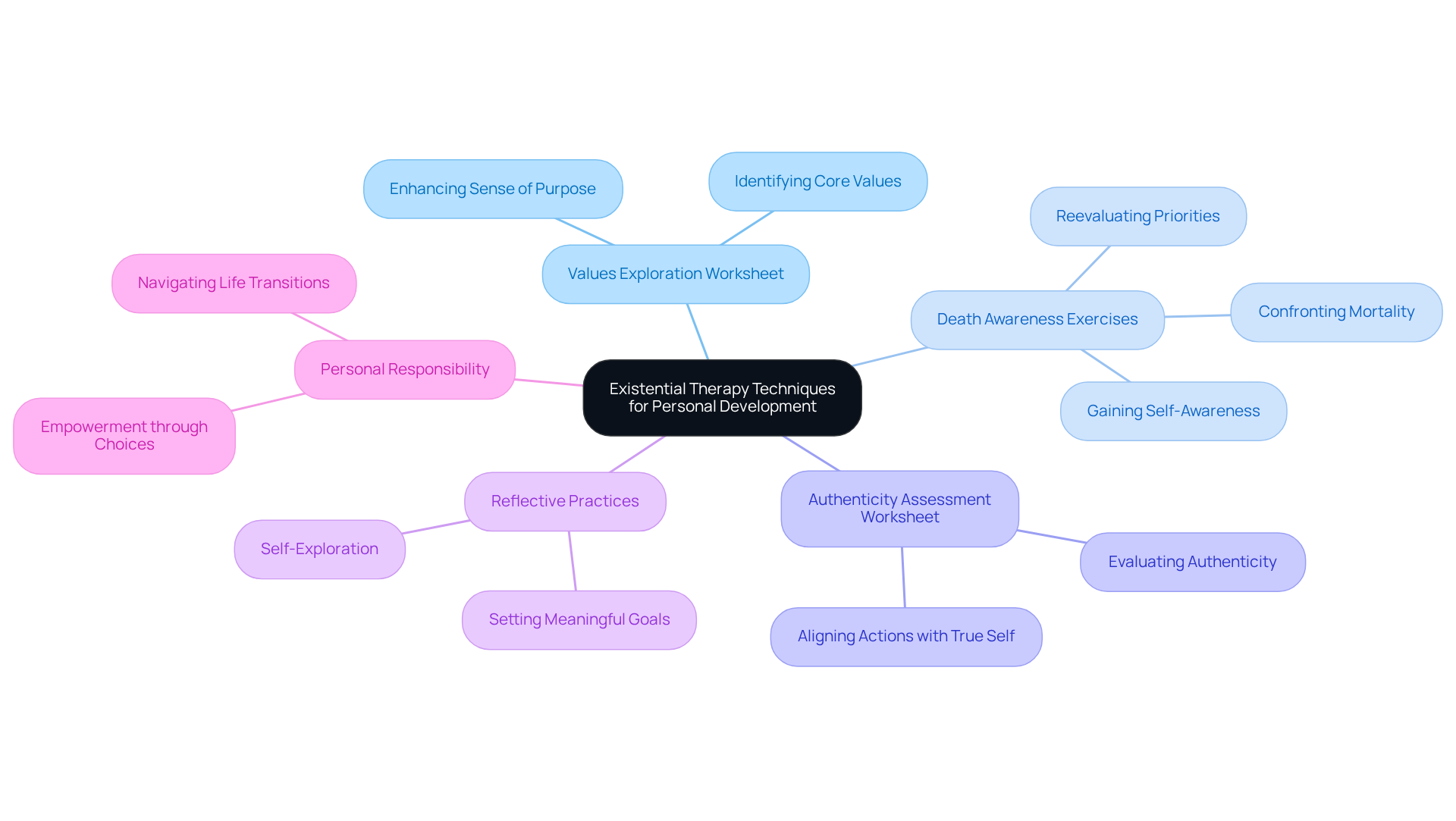
Therapy Group DC: Exploring Existential Therapy Techniques for Growth
Incorporating existential themes into therapy groups can significantly enhance personal development by fostering a sense of belonging and support among participants. Role-playing activities serve as a powerful method for individuals to practice new ways of being and engaging with the world. These exercises create a safe environment where individuals can step into different roles, exploring various perspectives and behaviors. This experiential learning can lead to profound insights and facilitate emotional healing, especially for trauma survivors who may feel haunted or paralyzed by their experiences. The ability to make sense of tragedy and find benefit in it is key to unlocking posttraumatic growth, making role-playing an essential component of the therapeutic process at The Emerald Couch.
Have you ever felt overwhelmed by your past? Therapists have noted that role-playing not only enhances social skills but also enables individuals to confront their fears and anxieties. For instance, a trauma survivor might engage in a role-play scenario that simulates a challenging social interaction, allowing them to rehearse responses and build confidence. This practice can illuminate patterns of avoidance or negative self-talk, providing a pathway for change. Furthermore, role-playing can incorporate specific coping techniques for OCD, such as exposure and response prevention, assisting individuals in managing their symptoms more effectively.
Real-life examples demonstrate the effectiveness of role-playing in therapy. One therapist observed an individual struggling with assertiveness; through role-playing exercises, the individual practiced standing up for themselves in various situations, ultimately leading to increased self-efficacy and enhanced relationships. Insights from therapists emphasize that these exercises not only promote personal growth but also enhance emotional vocabulary, enabling individuals to articulate their feelings more effectively. Additionally, the collaborative custom treatment planning at The Emerald Couch ensures that these role-playing exercises are adapted to meet each individual's unique needs, fostering a more personalized therapeutic experience.
Overall, existential therapy techniques, including role-playing activities in existential counseling, create a dynamic environment for exploration and transformation, enabling individuals to envision and enact their desired selves while fostering resilience and healing. The holistic method of The Emerald Couch further supports this process, offering a nurturing environment where individuals can safely participate in these transformative practices.
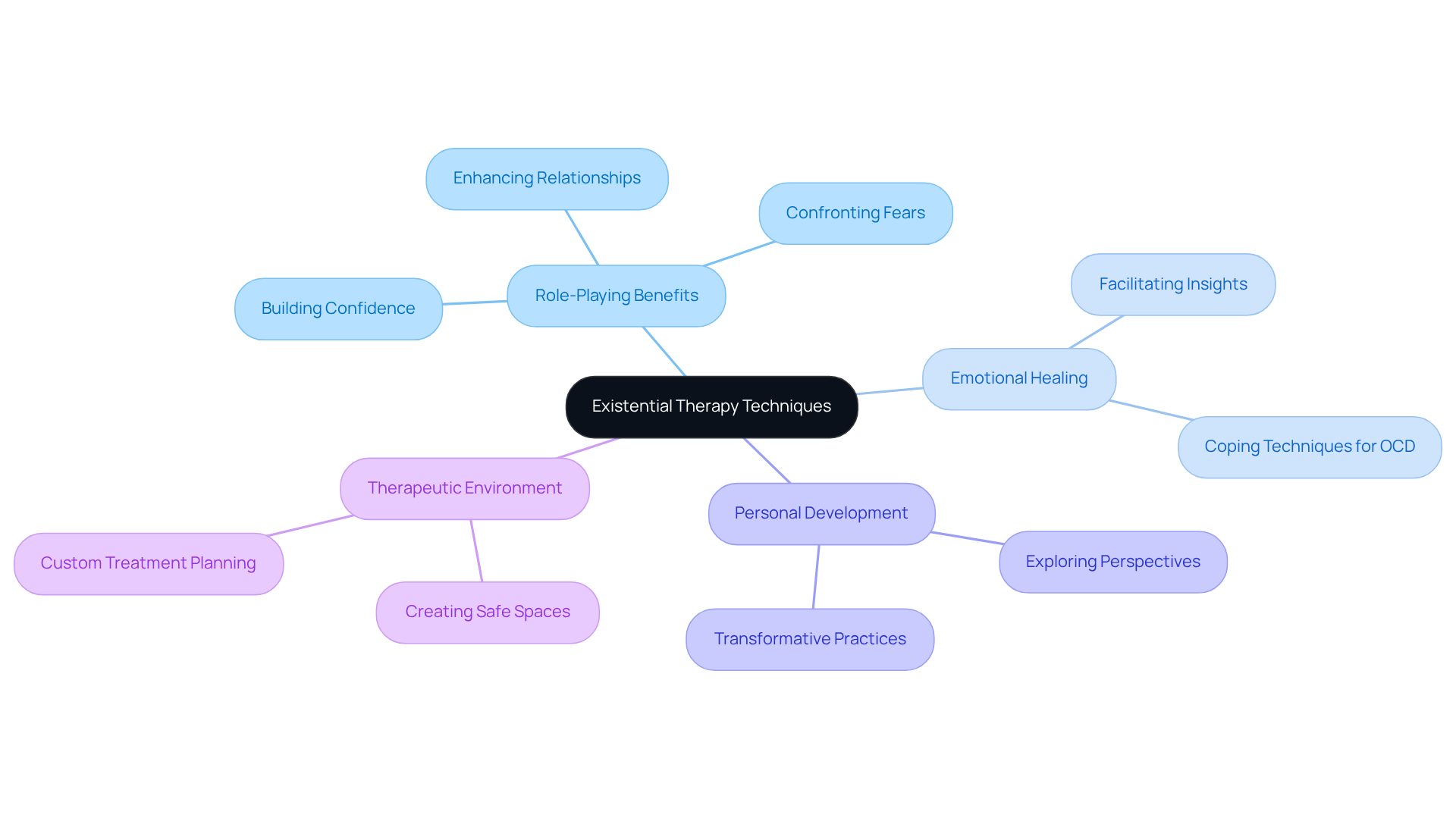
BetterUp: Empowering Personal Growth with Existential Therapy Techniques
Empowerment serves as a cornerstone of personal growth within existential therapy techniques, beautifully illustrated by the practices at The Emerald Couch. Methods such as strengths identification and values clarification play a crucial role in helping individuals uncover their unique attributes and core values. Did you know that over 20 percent of adults sought mental health treatment in 2022? This statistic underscores the growing recognition of the importance of mental well-being. By engaging in strengths identification, individuals can gain a clearer understanding of their capabilities, fostering a sense of agency and purpose in their lives.
Values clarification is equally vital, enabling individuals to align their actions with what truly matters to them. This alignment enhances therapeutic outcomes and promotes deeper self-awareness and personal growth. For instance, have you ever felt more empowered and motivated when expressing your values? Many individuals report that this leads to more meaningful life choices. Common goals in existential therapy techniques include understanding values and beliefs, embracing free will, and improving relationships—all of which contribute to a more fulfilling life.
Incorporating mindfulness practices, such as meditation and mindful breathing, into these techniques can further enhance emotional regulation and self-awareness. Mindfulness allows individuals to observe their thoughts and feelings without judgment, creating a space for reflection and choice. This practice can help you slow down automatic reactions, making it easier to engage with your strengths and values meaningfully.
Real-world examples illustrate the effectiveness of these techniques. In one case study, an individual struggling with decision-making due to 'analysis paralysis' found clarity by identifying personal values. This newfound understanding enabled them to make choices that resonated with their true self. Another case study highlighted a journey toward self-acceptance, where societal pressures initially hindered an individual's authenticity. Through values clarification and mindfulness, they embraced their true identity. This process of self-discovery is crucial in existential therapy techniques, as it encourages individuals to embrace their free will and create a life filled with meaning.
Creative expression through art, writing, and music also aids in exploring and processing emotions, enriching the therapeutic experience. Expert insights reinforce the significance of these techniques. Therapists emphasize that acknowledging strengths and defining values are not merely therapeutic activities; they are transformative processes that empower individuals to tackle their unique challenges and cultivate resilience using existential therapy techniques. As one expert noted, "You are not your diagnosis. You are not your worst day. You are so much more." By incorporating mindfulness and existential practices, The Emerald Couch provides a nurturing atmosphere where individuals can flourish and develop. We also acknowledge the stigma surrounding therapy, striving to create a safe, non-judgmental space for all clients. This allows you to embark on your journey of personal growth with confidence.
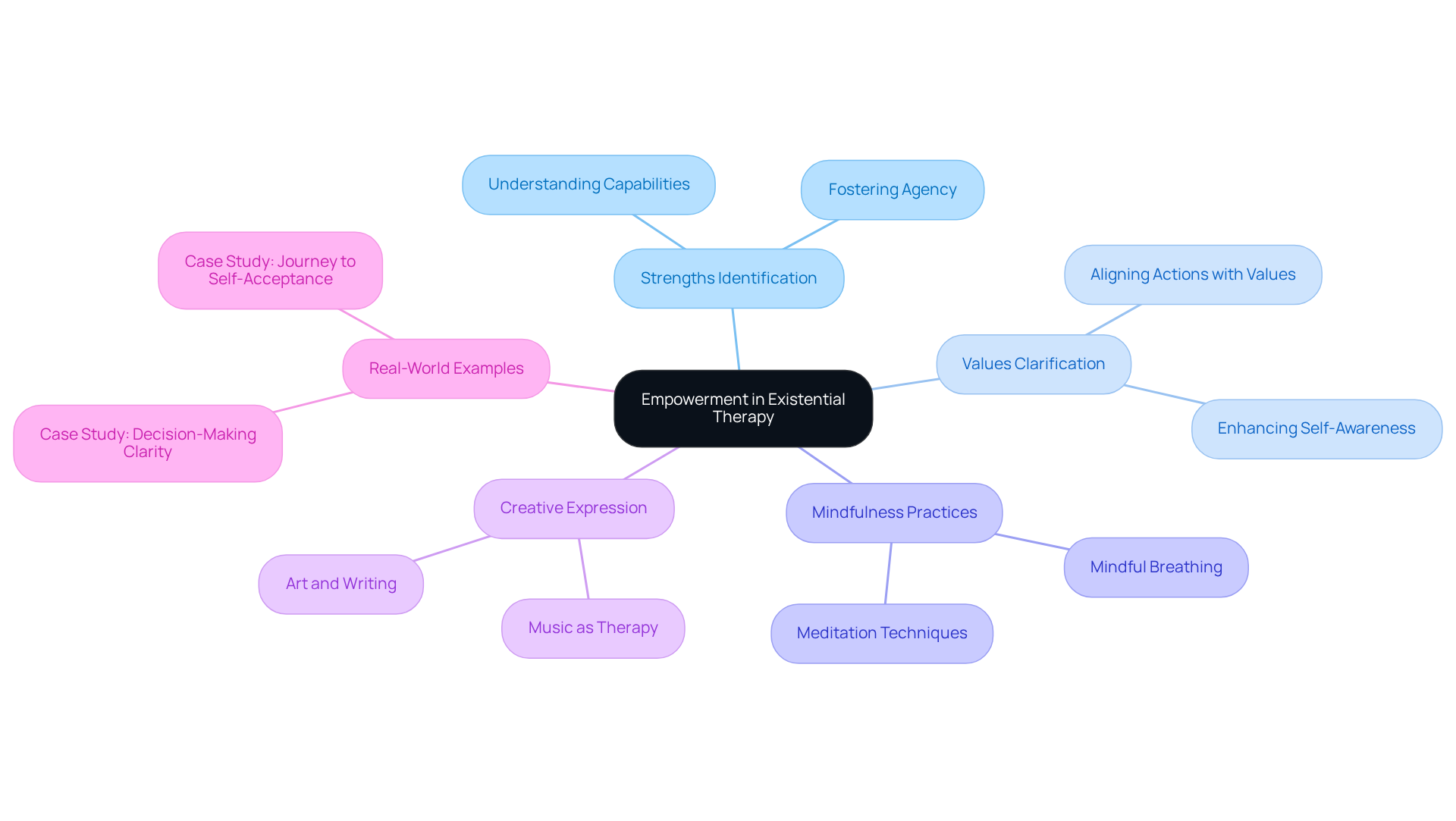
Conclusion
Existential therapy techniques offer a compassionate and empowering pathway for personal growth, inviting you to explore your identity, values, and life choices. By fostering a safe environment for self-exploration, these methods encourage deep introspection and facilitate healing from past traumas. At The Emerald Couch, the emphasis on personalized treatment highlights the importance of tailoring therapy to meet your unique needs, ultimately nurturing resilience and a renewed sense of purpose.
As we explore key techniques such as:
- Mindfulness practices
- Narrative therapy
- Structured worksheets
it's clear how significant these roles are in enhancing self-awareness and emotional regulation. These methods not only help you confront your existential challenges but also empower you to take ownership of your narrative. The integration of creative expression and goal-setting further enriches the therapeutic experience, enabling you to envision a future filled with meaning and fulfillment.
Reflecting on the transformative potential of existential therapy, it becomes evident that these techniques are not merely tools for self-improvement but gateways to profound personal development. Engaging in this journey can lead to enhanced emotional well-being, a deeper understanding of yourself, and a greater appreciation for life. Have you ever felt overwhelmed by your past? For those seeking to navigate their unique paths toward healing and growth, exploring existential therapy techniques may be a vital step in reclaiming your agency and fostering a more meaningful existence.
Frequently Asked Questions
What is existential therapy as offered by The Emerald Couch?
Existential therapy at The Emerald Couch is a personalized approach that explores existence, choices, and the significance of life experiences. It integrates trauma-informed care to help individuals navigate past traumas, fostering resilience and personal growth.
How does trauma-informed care enhance therapeutic outcomes?
Trauma-informed care significantly improves therapeutic outcomes by helping individuals regulate their emotions and feel a greater sense of agency in their lives. This approach nurtures a safe environment for personal insights and healing.
What techniques are used in existential therapy?
Techniques used in existential therapy include narrative approaches, mindfulness exercises, and reflective journaling. These methods empower individuals to confront existential challenges and gain a deeper understanding of their identities.
How does online access to existential therapy work?
The Emerald Couch offers online existential therapy techniques, allowing individuals to engage in self-improvement from home. This includes guided self-reflection and journaling exercises, as well as mindfulness practices like meditation and mindful breathing.
What is the importance of consistency in treatment sessions?
Consistency in treatment sessions is vital for effective therapy. The convenience of online support platforms enhances this consistency, leading to improved self-awareness and emotional strength among participants.
What role does mindfulness play in existential therapy?
Mindfulness is crucial in existential therapy as it enhances emotional regulation and personal growth. It helps individuals cultivate self-awareness and observe their thoughts and emotions without judgment, facilitating meaningful personal development.
What are the key methods of existential therapy for personal development?
Key methods include existential questioning, which encourages individuals to confront their beliefs and values, and the exploration of freedom and responsibility, helping them recognize their active role in shaping their lives.
How can existential therapy benefit trauma survivors?
Existential therapy empowers trauma survivors by helping them reclaim agency over their narratives and fostering resilience. It encourages them to confront their choices and responsibilities, which can be transformative despite being anxiety-inducing.
What outcomes can individuals expect from engaging in existential therapy?
Individuals often report newfound clarity regarding their objectives and a revitalized sense of purpose after participating in existential therapy, leading to significant personal growth and improved self-awareness.




